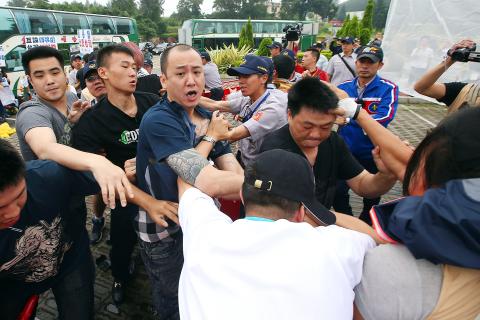Four young people protesting against China’s Taiwan Affairs Office Minister Zhang Zhijun (張志軍) in Kinmen were injured when they were attacked by black-clad men who had gathered to welcome his arrival, Taiwan Solidarity Union (TSU) Department of Youth Affairs director Chang Chao-lin (張兆林) said yesterday.
An attack against a young office worker surnamed Chang (張) resulted in the dislocation of his right shoulder, Chang Chao-lin said at 5pm, when Chang was in the emergency room of Kinmen Hospital for treatment.
Two college students were also at the hospital at that time for treatment after altercations, he said.

Photo: Chen Chih-chu, Taipei Times
One, surnamed Lee (李), suffered lacerations to his right ear after several black-clad men hit him over the head, while the other, surnamed Wang (王), had bruises on his head and hands from beatings, Chang Chao-lin said, adding that he was also kicked in the stomach.
“We were just voicing our opinions within the areas designated by the police as ‘protest areas.’ All of a sudden, about several dozen black-clad men rushed into the area and began to beat us,” Chang Chao-lin said.
The attack began when the group of about 70 protesters organized by the TSU threw a smoke grenade when Zhang’s motorcade passed.
Chang Chao-lin said the grenade was harmless.
“Because we were kept at a distance from Zhang, we had to do something to let him see our demands,” Chang Chao-lin said.
“Go back [to China],” the TSU protesters shouted, holding posters that said Zhang came with “united front” tactics to subdue Taiwan, and expressing opposition to the proposed plan for representative offices on both sides of the Strait and to the bid to join the China-led Asian Infrastructure Investment Bank, which they said would defraud Taiwan.
Zhang arrived at Kinmen harbor at about noon for a two-day visit that began with a meeting with Mainland Affairs Council Minister Andrew Hsia (夏立言).
Zhang was met by a crowd of between 400 and 500 people, including the men dressed in black and people carrying the banners of pro-unification groups, including China Unification Promotion Party, China Production Party and Patriot Association.
Chang Chao-lin accused the police of negligence over the assault.
“There were just four or five police officers stationed around us, even through they had seen several dozen black-clad men with gang tattoos who were watching us from the very beginning of the protest,” Chang Chao-lin said.
The black-clad men who were eventually taken away by the police were later released, Chang Chao-lin said.
“The police caught them red-handed. How could they let them go?” Chang Chao-lin asked.
Hung Chun-yi (洪俊義), commander of the Criminal Investigation Division of the Kinmen County Police Bureau, said that the police detained a man surnamed Wu (吳) and is checking for three other suspects they detained in the video footage taken by the police.
A man in the crowd welcoming Zhang was also injured, Hung said.

CHAOS: Iranians took to the streets playing celebratory music after reports of Khamenei’s death on Saturday, while mourners also gathered in Tehran yesterday Iranian Supreme Leader Ayatollah Ali Khamenei was killed in a major attack on Iran launched by Israel and the US, throwing the future of the Islamic republic into doubt and raising the risk of regional instability. Iranian state television and the state-run IRNA news agency announced the 86-year-old’s death early yesterday. US President Donald Trump said it gave Iranians their “greatest chance” to “take back” their country. The announcements came after a joint US and Israeli aerial bombardment that targeted Iranian military and governmental sites. Trump said the “heavy and pinpoint bombing” would continue through the week or as long

TRUST: The KMT said it respected the US’ timing and considerations, and hoped it would continue to honor its commitments to helping Taiwan bolster its defenses and deterrence US President Donald Trump is delaying a multibillion-dollar arms sale to Taiwan to ensure his visit to Beijing is successful, a New York Times report said. The weapons sales package has stalled in the US Department of State, the report said, citing US officials it did not identify. The White House has told agencies not to push forward ahead of Trump’s meeting with Chinese President Xi Jinping (習近平), it said. The two last month held a phone call to discuss trade and geopolitical flashpoints ahead of the summit. Xi raised the Taiwan issue and urged the US to handle arms sales to

State-run CPC Corp, Taiwan (CPC, 台灣中油) yesterday said that it had confirmed on Saturday night with its liquefied natural gas (LNG) and crude oil suppliers that shipments are proceeding as scheduled and that domestic supplies remain unaffected. The CPC yesterday announced the gasoline and diesel prices will rise by NT$0.2 and NT$0.4 per liter, respectively, starting Monday, citing Middle East tensions and blizzards in the eastern United States. CPC also iterated it has been reducing the proportion of crude oil imports from the Middle East and diversifying its supply sources in the past few years in response to geopolitical risks, expanding

Pro-democracy media tycoon Jimmy Lai’s (黎智英) fraud conviction and prison sentence were yesterday overturned by a Hong Kong court, in a surprise legal decision that comes soon after Lai was jailed for 20 years on a separate national security charge. Judges Jeremy Poon (潘兆初), Anthea Pang (彭寶琴) and Derek Pang (彭偉昌) said in the judgement that they allowed the appeal from Lai, and another defendant in the case, to proceed, as a lower court judge had “erred.” “The Court of Appeal gave them leave to appeal against their conviction, allowed their appeals, quashed the convictions and set aside the sentences,” the judges